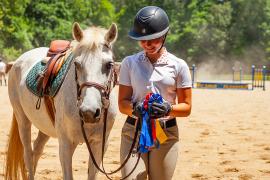Everyone is excited to be back at camp, and, in many cases, programs are seeing more participants than ever before. However, unique behavior issues are beginning to arise in campers, partially due to the pandemic. Campers who have missed out on in-person learning and after-school activities often struggle with following camp procedures and making friends, compared to pre-pandemic campers. This can be a challenge for new and veteran staff members, as normal behavior management techniques may be less effective than normal or don't address the right problems.
Understanding why campers are struggling is the first step to helping them. Below are a few examples of the unique ways kids may be struggling due to the pandemic and behavior management techniques to correct these behaviors.
Big Emotions Are Tough
You may notice that your campers have trouble communicating their emotions with staff and other campers. Extended time at home meant kids communicated their needs or expressed emotions less often to people other than their parents or guardians. On top of this, parents often have the advantage of anticipating their children's needs, requiring their kids to advocate for themselves less often.
Because they're unsure of how to communicate their emotions, campers may have more extreme emotional reactions to simple issues, especially if they are in a new setting or unfamiliar camp. Campers may shut down, cry, or in extreme cases, even express emotions in unsafe ways, like hitting or throwing.
First and foremost, it is your responsibility to keep all campers safe. Bring the more emotionally vulnerable child aside from the group and give them space to calm down. Once in a secure environment, simple questions can be a powerful way to approach the problem. Try statements like, "I see something is bothering you. Do you know why you're upset?" or "Can you use your words to tell me how you're feeling?" After the student has communicated the problem, work with them to create an action plan for the next time they get upset. For example, you could give them sentence stems to communicate feelings or model the right way to get your attention.
We Can't Always Get Our Way
At every camp or after-school activity, a few kids seem like they've never heard the word "no." These students are baffled when they don't get their way and whine about even the smallest compromise. Camp leaders may have techniques at their disposal to handle the occasional whining camper, but the issue has become more common than in past years. Because so much socialization happened in smaller group settings during the pandemic, today's campers are used to getting their way or having their opinions validated more often than kids with larger group experiences.
While other behavior issues only affect the individual camper, a group's inability to compromise can cause problems for everyone. Deadlock between campers means less time for fun activities. In years past, it might have been beneficial to let kids work problems out themselves, but during these months of transition, this strategy may not be the best option. To cut down on stalemates, try starting camp with more structure and fewer activities that open the door for big debates. Slowly integrate more independence into the programming, allowing kids limited options and celebrating successful resolutions.
Do You Want to Be My Friend?
One of the most obvious issues that stems from limited social interaction is anxiety around making new friends at camp. At a certain level, this is a common concern at camp. Your staff members probably know the tell-tale signs to look out for: kids sitting alone or being picked on. However, kids this year might struggle with both making friends and maintaining them, as inexperience with friendships can lead to increased interpersonal conflict.
To help campers build friendships, staff members can practice modeling friendship skills, demonstrating ways to approach the conversation or asking to join an activity through their interactions with kids. Intentionally build in more time for icebreakers, which gives campers the safety net of structured activity to make conversation. Rotating buddy systems can also be a good technique to ensure no one is ever left out, yet kids are socializing with various other campers.
Camp Should Be Fun for All
It may not always seem like it, but kids really do want to have a positive experience at camp where they make friends and participate fully. While there might be more barriers at camp following the pandemic, understanding how this event has shaped camper's social and emotional skills allows staff members to target underlying issues and create the best experience for everyone.
This blog post sponsored by Active Network.
Periodically, the American Camp Association (ACA) makes timely and relevant information about products and services available to its members so they can make informed decisions for their camps. However, the ACA does not endorse products, services, or companies.
The views and opinions expressed by contributors are their own and do not necessarily reflect the views of the American Camp Association or ACA employees.



